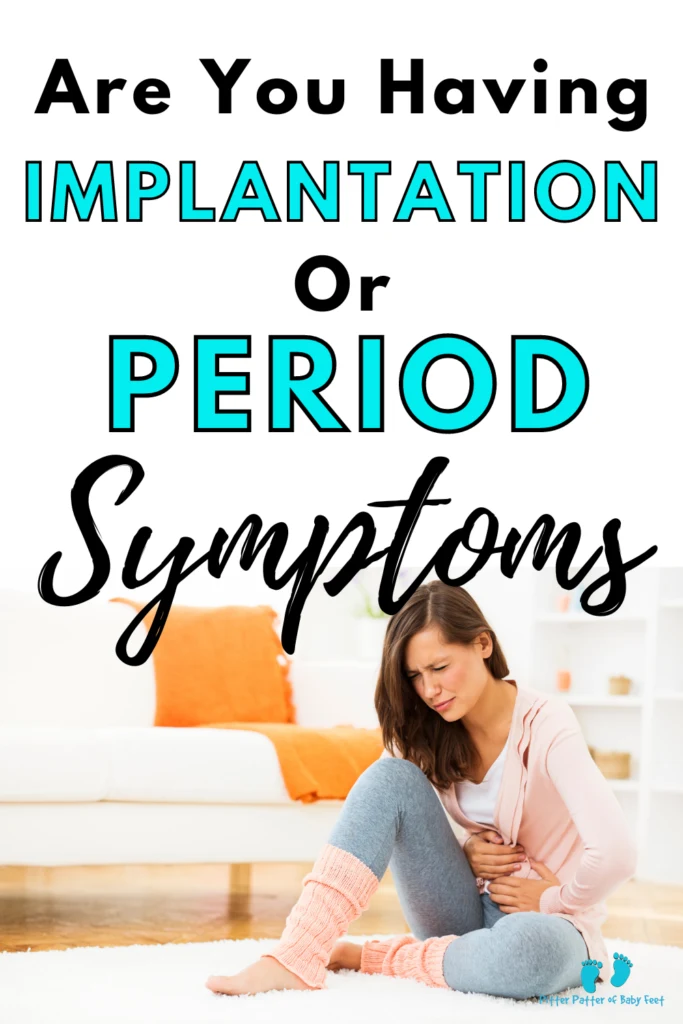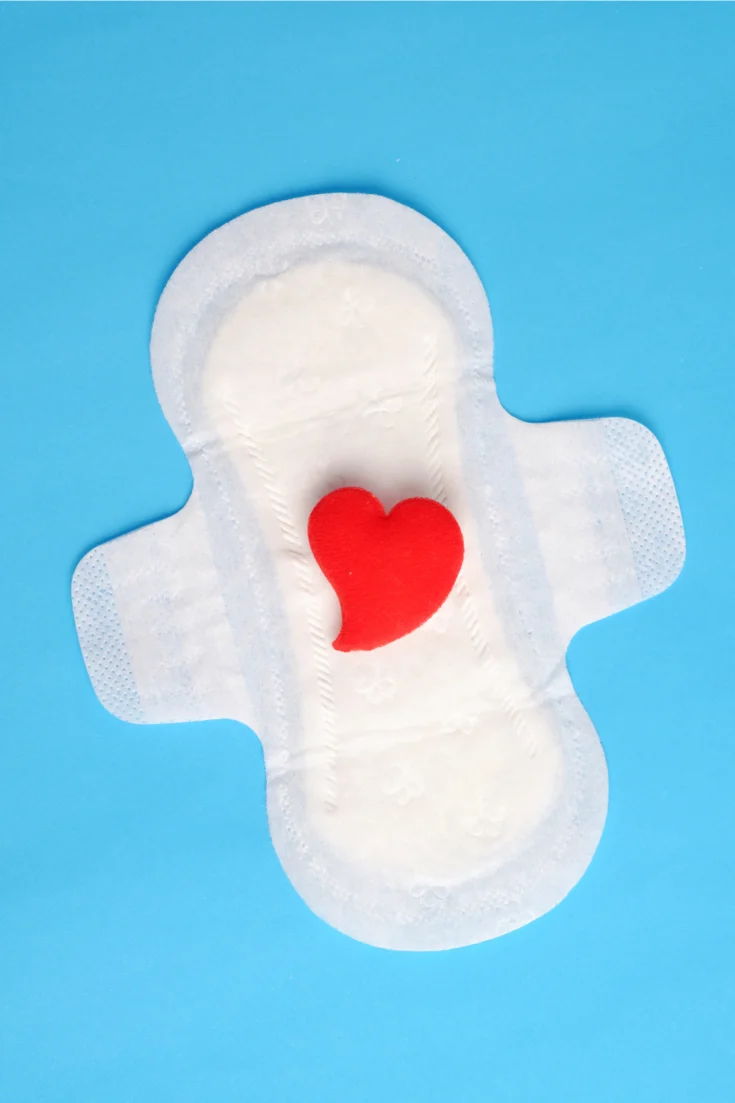
When you’re trying to conceive a baby, the two-week wait ticks by slowly.
The two-weeks between ovulation and your expected period is agonizing.
All of a sudden, your over analyzing every body cramp and ache.
But what if the symptoms you’re feeling are not your imagination?
If fact, it may be symptoms of implantation.
Although you don’t want to get your hopes up, it’s important to know the difference between implantation vs period symptoms.
Disclosure: Bear in mind that some of the links in this post are affiliate links and if you click on them to make a purchase I will earn a commission. Keep in mind that I link these companies and their products because of their quality and not because of the commission I receive from your purchases. The decision is yours, and whether or not you decide to buy something is completely up to you.
What Is Implantation?
Implantation is when a fertilized egg travels through your fallopian tube and implants in your uterus lining.
Symptoms of successful implantation take place at a certain time through your cycle.
Usually between 6 to 10 days after conception.
If you are trying to conceive and know exactly when you ovulate, it’s easier to pinpoint the time frame of implantation symptoms.
If you are not keeping track of ovulation, then it’s easy to mistake implantation symptoms for PMS or expected period symptoms.
Although the onset of implantation symptoms occurs between 6 to 10 days after ovulation, implantation bleeding happens later.
Implantation Bleeding
Implantation bleeding occurs 10 to 14 days after conception and only about 33% of women experience bleeding.
Just because you don’t experience implantation bleeding doesn’t mean you did not conceive.
You may have noticed that 10 to 14 days after conception is right around the time for an expected period.
That’s why many women confuse implantation bleeding for an expected period.
But if you take notice during that time frame, there are certain characteristics of implantation bleeding.
Characteristics Of Implantation Bleeding
- Pink or brown in color
- Blood volume is little (not enough to fill a menstrual pad)
- Normally lasts 24 to 48 hours
- Mild cramps (much milder than period cramps)

Related Articles: 6 Methods For Tracking Ovulation To Maximize Your Chances Of Pregnancy
How To Keep A Positive Attitude While TTC
Must Have Fertility Supplements For Couples
Implantation Cramps
Implantation bleeding and cramping often happen in conjunction. Cramps associated with implantation takes place 6 to 12 days after conception.
Characteristics Of Implantation Cramping
Implantation cramps may feel like the following sensations:
- Tingling sensations
- Pulling sensations
- Prickling sensations
It is not normal to have severe cramping 6 to 12 days after ovulation or around the time of implantation. If you experience intense cramping and heavy bleeding, consult a doctor immediately.
Personal Experience With Implantation Cramping
During my two and a half years of infertility, I finally conceived. Although I experienced no implantation bleeding, I did have cramping.
At the time, I didn’t know I was experiencing implantation cramping.
I only knew it was implantation cramping after I received a positive pregnancy test about a week to a week and a half later.
I remember the implantation cramping being very specific cramping. The cramping was light.
Not as severe as period cramps.
But the location of the cramping (at least for me) was different from period cramps.
Normally, with period cramps it is a moderate cramping that’s centered in my lower abdominal.
The location of implantation cramping for me was on the left side of my hip only.
From there the mild cramping was a pulling sensation and a tingling sensation that traveled down my left leg.
The main difference for me between implantation cramping and expected period cramping was…
Implantation cramping is not really painful, but an annoying type of cramping.

What Are The Other Symptoms Of Implantation?
Symptoms around the time of implantation are essentially very early pregnancy symptoms.
The main difference is the early onset of pregnancy symptoms occurring in the implantation window.
- Breast changes (particularly breast tenderness and swelling)
- High basal temperature
- Increased cervical mucus (white, slippery and increased volume)
- Frequent urination
- Food aversions or cravings
- Fatigue
- Nausea (or just feeling sick)
Difference Between Implantation Vs Period Symptoms
You may have noticed the list above looks very similar to the early signs of pregnancy.
So how exactly do you know the difference between implantation and period symptoms?
When it comes to telling the difference between implantation symptoms, there are two clear signs of early conception success: Implantation bleeding and nausea (with or without vomiting).
Looking back on my own implantation symptoms in my first and now my second pregnancy, implantation symptoms mimic PMS symptoms.
However, implantation symptoms are stronger than typical PMS symptoms.
With my first pregnancy before I knew I was pregnant I had implantation cramping, but also a host of PMS symptoms.
Honestly, I thought I was getting the worst period of my life!
Instead, I was just getting a miracle.
Related Articles: 15 Early Signs Of Pregnancy Not To Overlook
The All-In-One Guide To Increasing Your Fertility Naturally
Clear Signs Of Ovulation To Detect Your Most Fertile Time
Final Thoughts
Trying to conceive a baby is not as easy as people tend to think it is. It takes a lot of hard work and sometimes (like with me) fertility treatment.
The two-week wait in between ovulation and the first day of your expected period is not easy. It’s actually quite agonizing!
You go from a completely sane and emotional controlled person to a over thinking mess.
That two-wait can cause you to go through a whole host of emotions.
It’s very easy to get implantation symptoms and expected period symptoms confused.
Many women think they’re experiencing bad PMS, when really it’s the very early signs of pregnancy.
While other women have increased PMS and think they’re actually pregnant.
Honestly, there’s no sure-fire way to tell by symptoms if you are pregnant or not.
The only guarantee you will have is with a pregnancy test at the end of your two-week wait.
But, if you are at all curious and can stand the thought of waiting until the day of your expected period, then take an early detection pregnancy test.
The most sensitive on the market today is the First Results Early Pregnancy Test. It detects HCG (the pregnancy hormone) six days before your missed period.
However, the sooner you take the early results pregnancy test the less likely you are to get an accurate result.
For instance, if you take a test six days before your period and receive a negative, you may still be pregnant!
Any days before your expected period are not guaranteed to be 100% accurate on detecting pregnancy.
But, you never know! If your HCG is built up enough, you may be able to receive a positive pregnancy test before your expected period.
Just from personal experience though… Even if you receive a positive test before your expected period, still take a pregnancy test on the day of your missed period.
That way you can be 100% sure of pregnancy!
Symptoms alone will not tell you whether you’re experiencing implantation or period symptoms. Only a pregnancy test will!
Recognizing the differences between implantation vs period symptoms will help you determine whether you’re having period symptoms or you need to take a pregnancy test.
Works Cited
PMS symptoms vs. pregnancy symptoms
Implantation bleeding- signs, symptoms and when to worry
Is it implantation bleeding- or just my period?
What do the cramps feel like in early pregnancy?
Implantation bleeding vs. period: how to spot this early pregnancy symptom


Sabra Casey
Friday 1st of March 2019
Great info! Thank you for sharing!
Liz Talton
Saturday 2nd of March 2019
Sabra, Thank you for stopping by and commenting!